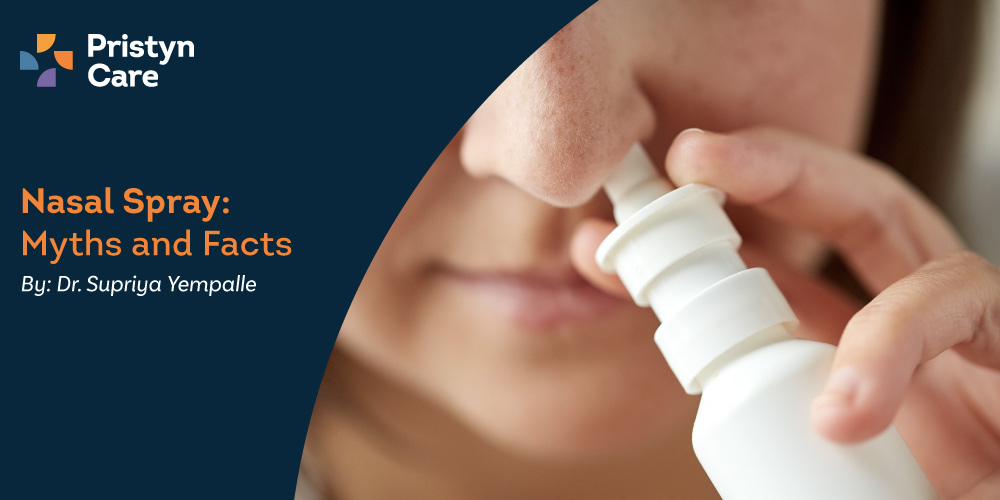
A stuffy, congested nose can make even the best day miserable and this can seriously affect quality of life. “Nasal spray” is a over-the-counter and prescription medications that are inhaled through the nose. These are used typically to relieve symptoms of allergies and sinusitis. These are effective but there are persistent myths surrounding these sprays that might make you feel hesitant to use them. Let’s debunk these allergy myths with facts about nasal sprays to help get rid of those misconceptions for good.
Table of Contents
What are nasal sprays?
Nasal sprays are medications inhaled into the body via a pressurized canister or spray bottle. Available both over-the-counter and in prescription form.
Three common myths about nasal spray
Myth 1: All nasal sprays are the same.!
Imagine this scenario: You have a cold or allergies and head to the pharmacy to get a nasal spray to help clear the congestion so you can breathe. All nasal sprays are the same, so you can grab the first bottle you see, right? Wrong.
There are 4 different types of sprays
- Saline nasal spray – these are like salt water rinse for your nasal passage. These are used to flush out irritating substances from nasal cavity before they cause inflammation. They also flush out excess mucus. For dry nose these sprays add healing moisture.
- Steroid nasal sprays – many people think of anabolic steroid when they hear about steroids. These are popular with bodybuilder who wants to improve muscle mass. Corticosteroids are not an anabolic steroid. Corticosteroids are useful for calming inflammation that happens because of an overactive immune response. Steroid spray apply corticosteroid directly into the nose to relieve symptoms of allergy.
Are nasal sprays addictive? – NO
Are nasal sprays safe to use? YES, they are safe for longer use with minimal systemic side effects. These should be started only after consulting your doctor.
Are there any side effects of nasal sprays?
Stinging and burning sensation in nose, throat irritation, occasional nasal bleeding.
- Antihistamine nasal sprays– These work similarly like steroid sprays. They are used in treatment of allergic rhinitis.
- Decongestant nasal spray– Decongestant nasal sprays alleviate congestion and a runny nose by temporarily shrinking the blood vessels in the nose (vasoconstriction). This type of nasal spray is typically sold over-the-counter with two main active ingredients, oxymetazoline and pseudoephedrine
Myth 2: You can get addicted to nasal sprays?
Decongestant nasal sprays can cause rebound congestion or rhinitis medicamentosa. The rebound effect is when your congestion can worsen when you stop using the decongestant nasal spray after long-term use, and it’s relatively common.
Decongestant spray provide immediate relief by shrinking swollen blood vessels in nasal cavity. This reduces inflammation and helps breath easily. These sprays are to be used for not more than 4-5 days. When you use them for more than 7-10 days it can cause rebound congestion. On prolonged use of these spray person will develop tolerance this means they need to take increasingly larger dose to achieve desired effect. tolerance can lead to physical drug dependency which is different than drug addiction.
“YOU CAN BECOME DEPENDENT ON NASAL SPRAY BUT NOT ADDICTED TO IT”
How can I break and reduce my dependency on nasal spray?
- Do not self medicated
- Do not use spray for more than 5 days
- Be aware of how often you are using spray
- If you are using it for long time, then stop using it and consult your doctor for proper treatment.
Myth 3: Nasal sprays take weeks to be effective?
A common misconception is that all nasal sprays take several weeks to provide any lasting effect. However, the actual time it’ll take largely depends on the type of nasal spray used. Saline nasal sprays are the most fast-acting type whereas Steroid nasal sprays can take two to three days to help symptoms, but it can take a couple of weeks for full relief.







